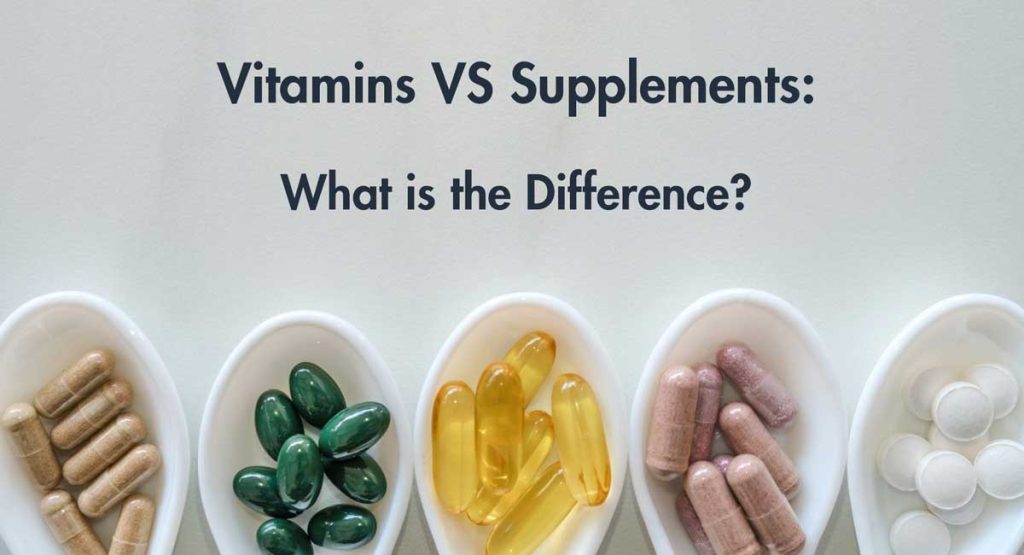If you’re in the habit of shopping for products such as vitamins, minerals, herbs, and natural remedies, you may wonder about the vitamins vs. supplements distinction. What are supplements and are they a separate category from vitamins? For that matter, what are vitamins? In this article, we’ll be looking at these questions as well as some tips on how to choose a vitamin supplement that meets your needs.

What Are Vitamins?
If you ask a scientist, “what are vitamins?” they’ll tell you that it’s an organic compound that’s essential for the human body. There are many vitamins that we need, such as Vitamins A, B complex, C, D, E, and many others. You get many essential vitamins from foods, but you may be deficient in certain vitamins because of your diet.
What Are Supplements?
A supplement can be anything you take to support health or well-being. This may include vitamins, minerals, herbs, or food-based items such as concentrated formulas with fruits, vegetables, mushrooms, wheatgrass, or many other foods. Protein supplements are another popular category, made from plant or animal based proteins such as whey, soy, hemp, and others. Other commonly taken supplements are Vitamin C, calcium, melatonin, zinc, and echinacea.
Vitamins vs Supplements: What's the Difference?
The distinction between vitamins and supplements comes down to definitions and popular usage. Vitamins are a specific category of supplement that can be distinguished from others such as minerals and herbs. What are supplements? A supplement is a broader category that may include anything taken to support health. Supplements may serve many functions, such as weight loss, pain relief, muscle growth, relaxation, or any other purposes. The vitamins vs supplements question is best understood by remembering that vitamins are only one type of supplement.
How to Choose a Vitamin Supplement
When you think about questions such as vitamins vs supplements, what are vitamins, or what are supplements, you mainly want to find solutions to your health problems and feel better. Here are some tips to keep in mind when wondering how to choose a vitamin supplement.
- The reputation of the brand. How long they’ve been in business, whether they use third-party laboratory testing, customer reviews.
- Cost of products.
- What is your age, gender, lifestyle, and state of health? Supplements may be more appropriate to people of a certain age, men or women, or those who have a certain condition.
- What are your goals? It’s easy to get distracted with so many supplements promising to do so many things. Focus on what you need most so you find the most relevant solution.
- Note the potency of a product. The same vitamins can be sold with different potencies. For example, Vitamin C may be 250 mg, 500 mg, or 1000 mg. The same is true for all types of supplements. Make sure you’re getting the right dosage for your needs.
- What does the research say? You have to go beyond the ads or web pages of manufacturers to determine the effectiveness of a supplement. Find out if there’s solid research to back their claims.
- Are you taking any medications? Make sure that any supplements don’t conflict with medications. Read labels and ask your doctor if you have any doubts.
Vitamins vs Supplements: Make the Right Choice
There’s so much written about vitamins vs supplements that it can be challenging to find the items that are targeted to your condition. Depending on your needs, you may want to take a single vitamin or find a formula that combines various ingredients. You also have to try supplements for yourself and learn through experience which ones are truly helpful.
At NutraPak USA, we offer a variety of supplement ingredients and services. Contact us or request a quote for more information!




